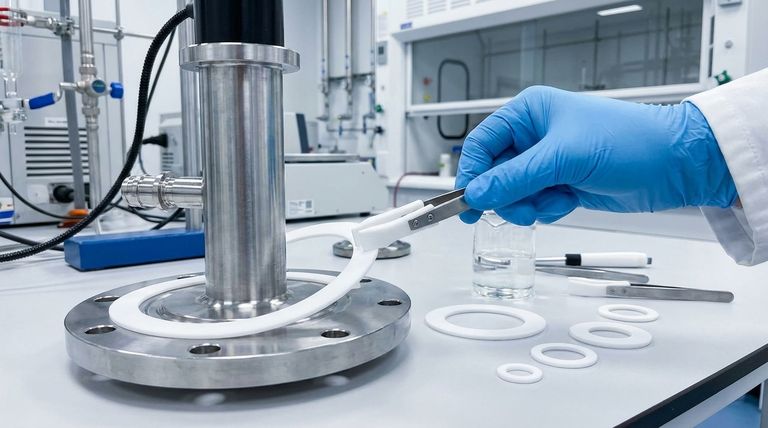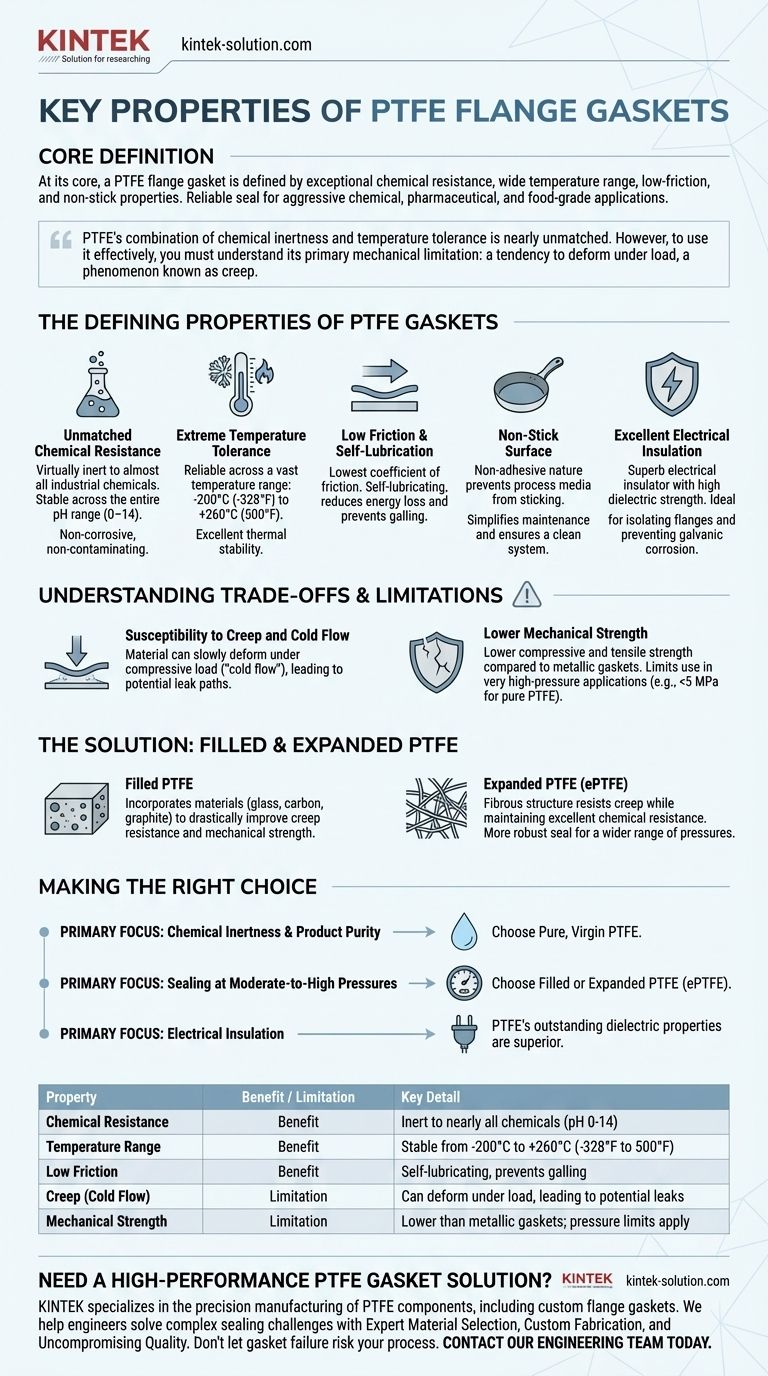At its core, a PTFE flange gasket is defined by its exceptional chemical resistance, extremely wide operating temperature range, low-friction surface, and non-stick properties. Made from polytetrafluoroethylene (PTFE), these gaskets provide a reliable seal in environments where other materials would quickly degrade, making them indispensable for aggressive chemical, pharmaceutical, and food-grade applications.
PTFE's combination of chemical inertness and temperature tolerance is nearly unmatched. However, to use it effectively, you must understand its primary mechanical limitation: a tendency to deform under load, a phenomenon known as creep.

The Defining Properties of PTFE Gaskets
PTFE's unique molecular structure gives it a set of properties that make it a highly specialized sealing material. Understanding each property helps clarify its ideal use cases.
Unmatched Chemical Resistance
PTFE is virtually inert to almost all industrial chemicals. It remains stable across the entire pH range (0–14), from strong acids to aggressive bases.
This makes it non-corrosive, non-contaminating, and non-wetting, ensuring that the gasket will not react with or contaminate the process fluid.
Extreme Temperature Tolerance
PTFE gaskets perform reliably across a vast temperature range, from cryogenic conditions as low as -200°C (-328°F) up to high-heat applications reaching +260°C (500°F).
This thermal stability allows it to be used in processes involving extreme temperature fluctuations without becoming brittle or degrading.
Low Friction and Self-Lubrication
PTFE has one of the lowest coefficients of friction of any solid material, often compared to wet ice on wet ice.
This low-friction, self-lubricating quality reduces energy loss in dynamic systems and prevents galling or seizing of flange surfaces during assembly and disassembly.
Non-Stick Surface
The material's non-stick, or non-adhesive, nature prevents process media from sticking to the gasket surface.
This is critical for ensuring a clean system, simplifying maintenance, and preventing the buildup of material that could compromise the seal or contaminate future batches.
Excellent Electrical Insulation
PTFE is a superb electrical insulator with high dielectric strength. This property makes it an ideal choice for isolating flanges in electrical equipment or preventing galvanic corrosion between dissimilar metal flanges.
Understanding the Trade-offs and Limitations
While its chemical and thermal properties are superior, pure PTFE has mechanical weaknesses that are critical to consider. Ignoring them is a common source of sealing failure.
Susceptibility to Creep and Cold Flow
The most significant limitation of virgin PTFE is its tendency toward creep and cold flow.
Under the compressive load of a bolted flange, the material can slowly deform and "flow" out of its intended shape, especially at elevated temperatures. This leads to a loss of bolt torque and a potential leak path over time.
Lower Mechanical Strength
Compared to metallic or semi-metallic gaskets, pure PTFE is a soft material. It has lower compressive and tensile strength, which limits its use in very high-pressure applications.
For pure PTFE, pressure ratings are often modest, with some references citing limits around 5 MPa (725 psi) without some form of reinforcement.
The Solution: Filled and Expanded PTFE
To overcome these mechanical limitations, manufacturers have developed modified versions of PTFE.
Filled PTFE incorporates materials like glass, carbon, or graphite to drastically improve creep resistance and mechanical strength. Expanded PTFE (ePTFE) has a fibrous structure that resists creep while maintaining excellent chemical resistance, creating a much more robust and reliable seal for a wider range of pressures.
Making the Right Choice for Your Application
Selecting the correct gasket requires balancing PTFE's benefits against the mechanical demands of your system.
- If your primary focus is chemical inertness and product purity: Pure, virgin PTFE is the ideal choice for applications in the food, pharmaceutical, and aggressive chemical processing industries.
- If your primary focus is sealing at moderate-to-high pressures: Choose filled PTFE or expanded PTFE (ePTFE) to gain the necessary creep resistance and mechanical strength for a durable, long-term seal.
- If your primary focus is electrical insulation: PTFE's outstanding dielectric properties make it a superior choice for isolating flange connections and preventing electrical conductivity.
By understanding both its unparalleled advantages and its inherent trade-offs, you can confidently specify the right type of PTFE gasket for a safe and reliable seal.
Summary Table:
| Property | Benefit / Limitation | Key Detail |
|---|---|---|
| Chemical Resistance | Benefit | Inert to nearly all chemicals (pH 0-14) |
| Temperature Range | Benefit | Stable from -200°C to +260°C (-328°F to 500°F) |
| Low Friction | Benefit | Self-lubricating, prevents galling |
| Creep (Cold Flow) | Limitation | Can deform under load, leading to potential leaks |
| Mechanical Strength | Limitation | Lower than metallic gaskets; pressure limits apply |
Need a High-Performance PTFE Gasket Solution?
Understanding the properties of PTFE is the first step. Selecting the right material and design for your specific application is what ensures a safe, reliable, and long-lasting seal.
KINTEK specializes in the precision manufacturing of PTFE components, including custom flange gaskets. We help engineers in the semiconductor, medical, laboratory, and industrial sectors solve complex sealing challenges by providing:
- Expert Material Selection: Guidance on choosing between pure PTFE, filled PTFE, or expanded PTFE (ePTFE) to balance chemical resistance with the mechanical strength required for your pressure and temperature conditions.
- Custom Fabrication: We manufacture from prototypes to high-volume orders, ensuring a perfect fit and optimal performance for your flanges.
- Uncompromising Quality: Our focus on precision production guarantees a gasket that delivers on PTFE's promise of superior chemical inertness and thermal stability.
Don't let gasket failure risk your process. Contact our engineering team today to discuss your application requirements and get a quote for a custom PTFE sealing solution.
Visual Guide

Related Products
- Custom PTFE Parts Manufacturer for Teflon Parts and PTFE Tweezers
- Custom PTFE Parts Manufacturer for Teflon Containers and Components
- Customizable PTFE Seals Filter Holders for Versatile Applications
- Custom PTFE Sealing Tapes for Industrial and High Tech Applications
- Custom PTFE Sleeves and Hollow Rods for Advanced Applications
People Also Ask
- What is PTFE and why is it desirable for CNC machining? Unlock Superior Performance for Demanding Applications
- Which types of filled PTFE offer high resistance to extrusion? Moly, Glass/Moly, and Polyimide
- What are the primary applications of Teflon parts in the aerospace industry? Essential for Seals, Bearings & Insulation
- What are some common applications of PTFE Expansion Bellows? Solve Corrosion, Temperature, and Vibration Challenges
- In which industries are PTFE ball valves commonly used? Essential for Chemical Resistance & Purity
- What types of environments are PTFE rotary shaft seals suitable for? Engineered for Extreme Chemical, Temperature, and Speed
- What factors should be considered when choosing a gasket material? A Guide to Reliable Sealing
- How do PTFE encapsulated O-rings compare to solid PTFE O-rings? Choose the Right Seal for Your Application



















